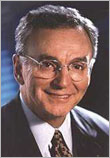|

"Earth, Fire, Water, Air, and Life"

 |
Dr. Joseph Bordogna
Deputy Director
Chief Operating Officer
National Science Foundation
Biography
Remarks for NSF-DFG Research Conference
April 5, 2004
|
Thank you Dr. Winnacker. It is a pleasure to be here today to welcome all
of you to this workshop sponsored jointly by the DFG and NSF.
Let me begin by congratulating Dr. Winnacker on having been elected
President of the DFG for a third term by the members of DFG's governing
association. I understand this has occurred only twice before since
the DFG's founding in 1951. It is a clear indication of the members'
respect for your past leadership and their confidence in your vision
for DFG's future.
It is no accident that NSF and the DFG are co-sponsoring today's
workshop. Our organizations have a history of working together.
Right now we are running a joint call for proposals to research
the Arabidopsis genome; we have established close connections with
the DFG on our Centers for Research on Learning and Teaching; we
are working on a joint review of proposals between our Chemistry
Divisions; and we will again be coordinating review of Materials
Research proposals. Both of our research communities benefit greatly
from access to the expertise, equipment, and infrastructure in
these joint endeavors. The research connections offer the possibility
for exchange of students—an ever more important part of a
student's training in this age of increasing globalization.
I would like to express my thanks to Marina Koch-Krumrei and her
predecessor, Walther Klofat, of the DFG Office in Washington, for
conceiving today's workshop. Thanks to the efforts of the Program
Officers and Division Directors in both DFG and NSF, this workshop
was made possible and will advance the role of transnational scientific
exchange. I would also like to thank the US and German professors
on the workshop organizing committee.
The theme of the workshop, "Earth, Fire, Water, Air, and
Life," is both timely and important. Many of the areas of
study you will discuss today have significance not only for the
state of our knowledge, but also for the health of our human habitat.
We need to progress in our understanding of earth, atmospheric,
and ocean sciences individually, while at the same time advancing
our ability to model and predict interactions among these systems.
From earthquake nucleation to biological evolution, from nanoscale
mineral-microbe interactions to core-mantle convection, it is at
the earth's interfaces that we will find the revolutionary discoveries.
Only through an understanding of the complex processes and interactions
on all spatial and temporal scales will we be able to assess humankind's
effect on the environment and our place in it.
You are here because of the impact your research has had in one
or more of these important topic areas and because you represent
the coming generation of researchers that will take us beyond the
present frontier. This is an opportunity to discuss the research
in which you are engaged and to investigate opportunities for starting
new collaborations. We ask you to pay particular attention today
to crossing boundaries—disciplinary boundaries, cultural
boundaries, organizational boundaries, geographical boundaries.
Why do we place special emphasis on crossing boundaries and working
together? Aristotle, in his Metaphysics, put it well—well
enough, in fact, for it to be engraved, in Greek, on the frieze
that runs along the top of the National Academy of Sciences building
on Constitution Avenue here in Washington. Aristotle says,
"The study of Truth is in one sense difficult, in another
easy. This is clear because no one person can obtain a complete
grasp of it, but we cannot all fail in the attempt. Each thinker
makes some statement about the natural world, and as an individual
contributes little or nothing to the inquiry; but a combination
of all conjectures results in something grand."
We therefore wish you success today and in the future in finding
ways to collaborate and to "combine your conjectures." Thank
you for your attention and thank you for being here today.

Return to a list of Dr. Bordogna's speeches.
|











